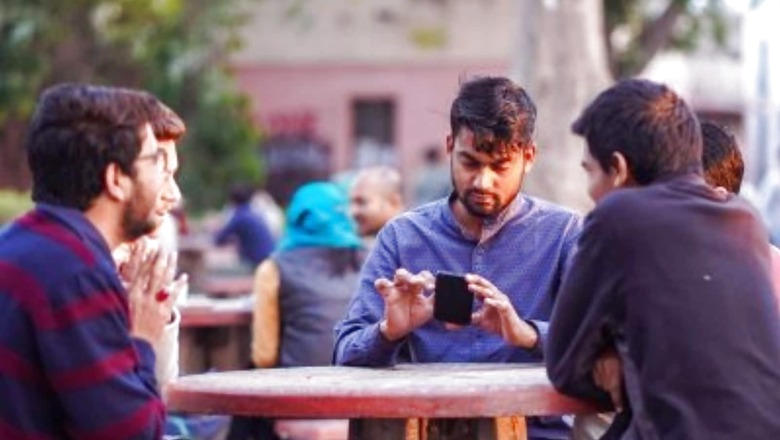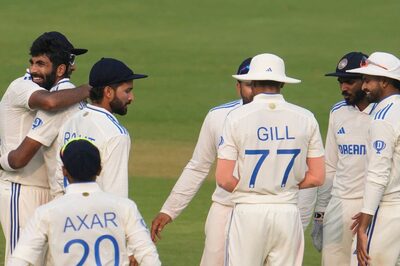
views
Policy Talk is a conversation with thought leaders, writers and policy practitioners. The objective is to have a discussion on current and future policies that will have an impact on us.
Ravi Venkatesan is a business leader who has led diverse companies like Cummins India, Microsoft India and Bank of Baroda. He is a social entrepreneur with Global Alliance for Mass Entrepreneurship (GAME) and UNICEF’s Special Representative for Young People and Innovation. In conversation with K. Yatish Rajawat, he spoke about how people need to prepare for a highly uncertain world with careers no long following a linear line of growth.
Yatish Rajawat: Ravi, tell us about your book ‘What the Heck Do I Do with My Life’ and what are the primary messages you wanted to convey through it?
Ravi Venkatesan: The subtitle of the book is “how to flourish in turbulent times,” which is the period we’re living through. I’d like to think of it as a book about personal leadership. If you were walking into a physical bookstore, you may find it in the self-help section, but you’ll also find a copy in the leadership section. We’re living in a period of extraordinary change. The world will change more in the 21st century than it has in all of human history. And the reason there’s a dinosaur on the cover of the book is because this is a period of such sudden and extreme change that some will manage to flourish and others who don’t adapt will perish like the poor old dinosaur.
But the good news from that extinction was that mammals became dominant, otherwise we wouldn’t be here. This period is extremely challenging, but is also throwing up incredible opportunities; those who are able to cash in on the opportunities will do very well.
Yatish Rajawat: You talk about meta skills and you say they are more important than a college degree. Most of these skills like better social and leadership skills, creativity and complex problem-solving skills cannot be taught from a book or are very difficult to teach. Where should people go to learn these meta skills?
Ravi Venkatesan: The education system is catering to a world that no longer exists. A world that was stable, where there were more reasonably abundant jobs for those who were educated, a world in which information was scarce. That has changed. And so I say, there are three or four meta skills or super skills that will really matter. One is learning agility, the ability to adapt to a situation you’ve never encountered before. The second is an entrepreneurial mindset. Not everybody is going to be an entrepreneur, but everybody needs the capacity to see opportunities, seize them, to be tenacious, creative problem-solvers. And then, the third meta skill is life skills. Almost every problem requires collaboration within an organisation, across organisations or even across sectors. So, social skills like creativity, problem-solving, collaboration, communication will become hugely important.
None of these skills can be learned in a classroom and certainly not online. The only way to learn is through real-world experiences, particularly what I call Crucible Experiences, which is take on challenges which are outside your comfort zone and in the process of figuring it out, you develop all these skills. So I look back at my life and ask: What were the Crucible Experiences? For instance, going to IIT was a Crucible Experience. I’d always lived at home; living in a hostel and competing with some really smart people was quite tough. Going to the US and with almost no money, finding a job, rapidly climbing my way up was a Crucible Experience. Everybody can learn these skills. We run a huge programme in Delhi government schools called entrepreneurship mindset curriculum, and we’ve seen million-two million kids going through the programme and learning it experientially. So it’s very doable.
Yatish Rajawat: I want to quote from your book, “to retire at 60 and spend the next 30 years vacationing will be boring and unhealthy.” Even if people at that age want to work, it’s not very easy for them to find work. That is one class. And there’s a second type, essentially a younger generation whose basic needs are already met and lack ambition. What is your advice for these two types of people?
Ravi Venkatesan: I think just focusing on the income part of the work trivialises it. Somebody asked me, ‘Who are you?’ I’m a journalist. I’m a writer, I’m an entrepreneur. I’m a scientist. So identity is something that comes from your work. You find your community through work, you learn new things, you get the experience and satisfaction of accomplishing things, which is psychologically important. How are you going to get all these things when you retire, even if you are financially secure? That’s why I say, retirement is a seriously bad idea. And what you need to do is find a way to stay engaged and productive. But the problem is, companies don’t like to hire even someone who’s 50 years old, let alone 60, 70 or 75. That’s one issue.
And the second thing is that knowledge is changing very quickly. And so you can be obsolete in five years. So you have to stay abreast from a skills and knowledge perspective. This is why, particularly as we are living longer lives, it is important to figure out this intersection between what you find interesting, what you’re good at and what you enjoy. And that’s the way you stay engaged.
Yatish Rajawat: How have you managed to do it successfully, not only change industries, but also stay relevant by doing new things? What do you think was the key? Was it the network or was it the continuous effort or knowledge?
Ravi Venkatesan: While the number of transitions I have made may sound unusual today, I think it’s going to be the norm a decade from today. The key is – intangible assets. We always think about tangible assets like savings, house and all that. The intangible assets, which are your networks, your reputation, your professional reputation, your expertise, your health, your family and close relationships are crucial. Because when we have shocks like the pandemic, they are the ones that provide you the cushion. And, also make you portable. So I can go from making diesel engines to software to Bank of Baroda to UNICEF, to being a social entrepreneur with GAME tomorrow. The energy field is reasonably seamless because I have cultivated these assets very consciously. I highly recommend it to people – think about your intangible assets, at least as much as you cultivate your tangible assets.
Yatish Rajawat: You mention half life of skills and how that is shrinking – how quickly certain skills are becoming obsolete. You can keep learning new skills, but even the way you learn these skills is changing. This is affecting not only the way students look at their skills but also how government looks at these skills within their own bureaucracy?
Ravi Venkatesan: Fifty years ago, information was scarce. So what was important was how well you memorise information, facts, etc. because that was an advantage. And so you tested people on how much they had memorised, how well they had memorised. Today, a child with a cell phone has all the world’s information on her fingertips. Whether or not you know how to find the right information becomes more important. And the kind of skill that is important now is being able to connect the dots across fields in order to synthesise a picture. This is why these new-age skills, creativity and lateral thinking, become important. But neither the education system nor corporate learning knows how to deliver these skills, nor are we assessing them. But if you see new-age companies like Google, they are now saying, ‘Look, we no longer need an undergraduate degree or certificate. What matters is that you pass our aptitude test’. And they are testing for these things. So more people are realising the importance of these skills over a degree, and you’re seeing this also in the unemployment figures. Young people with a higher education degree are more unemployed than people with a basic degree.
Yatish Rajawat: Interestingly, the Army has always recruited on the basis of skill. The Army recruitment has three components: the physical component, a written component to gauge basic IQ level, and a psychological test that involves problem-solving.
Ravi Venkatesan: Google is doing a good job of recruiting that way by defining what is important, and I describe the results of that briefly in my book. You’re talking about the Army, but even when I was with Cummins and we were setting up a new factory in Jamshedpur in 1996 and I was the CEO there, the way we recruited our workforce was by actually getting them to do simple tasks and seeing whether they would follow instructions, how well they worked with each other in teams. We learned this even before BMW. I think Taj Hotels, Indian Hotels also have been clever about this stuff, but such firms are an exception. I think more and more are figuring it out.
Yatish Rajawat: What is your writing schedule like? How do you plan it? How did you plan this book?
Ravi Venkatesan: I’m an occasional writer. This is my second book; when I care about a topic, I write about it in the form of an 800 to 2000-word piece. And then I shop it around. I wouldn’t say I’m a serious, disciplined writer like you. So my writing approach has been to take a topic, think about it, research it by reading books or getting on the net. I take lots of notes. Interestingly, people like Bill Gates still use these things. And I belong to that school. And then I try to go away. I go away somewhere and try and get into a flow. And when I get into that flow after two or three days of decompressing, I’m able to get enormously productive.
So in my last book, for instance, I luckily I got a Rockefeller scholarship to go writing and stay in Italy in The Bellagio Center. And I wrote one perfect chapter every day. I would get up in the morning, start writing at 8 am and by 4 pm, I would have a near-perfect chapter. It was like the universe was dictating and I was simply typing. And so, I came away with a nearly perfect book. For this book, because of COVID I couldn’t go far away, but I ended up renting a place on the outskirts of Bengaluru, which is very quiet, rural, but which has a lovely restaurant nearby. And I did a lot of my writing starting around 8 every morning and then through the day. I try and get into a zone where I’m productive.
Yatish Rajawat: What advice do you have for promoting a book and choosing a publisher?
Ravi Venkatesan: My first publisher was Harvard Business Review, and that’s because it was a serious business book. And so I wanted a publisher who focused on business books and catered to that space. This time I wanted reach. So after some discussions, I picked Rupa because they have a very wide distribution. What I’ve realised is that the economics of publishing has really changed over the decade, and they don’t make a lot of money on these books, except the occasional Amish Tripathi or something like that. And so I would tell every author, especially young first-time authors, that writing a good book is 10 per cent of the job. Going out and talking about it is 90 per cent of the job, which is what we what we are doing today. Reading habit has declined, few people read books or buy books and go through them. So the book is mostly for organising your own thoughts and having a calling card like this. The rest of it, you have to get out in the form of podcasts, conversations, talks, videos, etc. because the world is consuming information today in a very, very different way. And, the book is only the starting point.
Listen to the podcast here.
Watch the interview here.
Read all the Latest Opinion News and Breaking News here


















Comments
0 comment